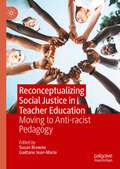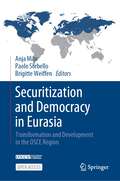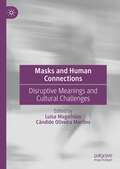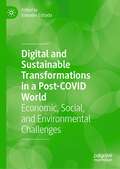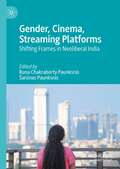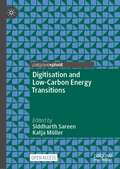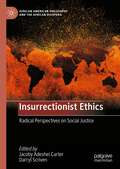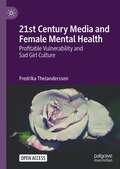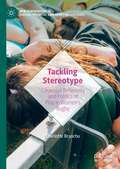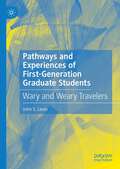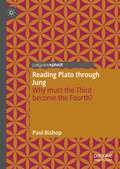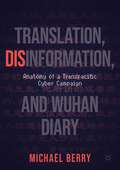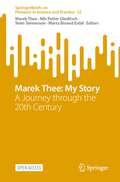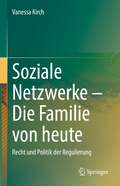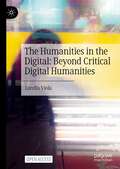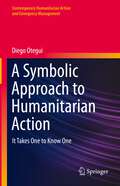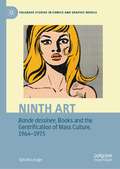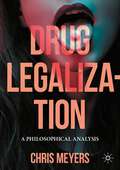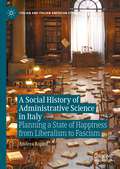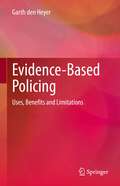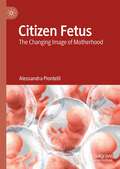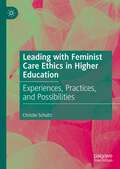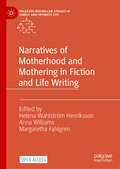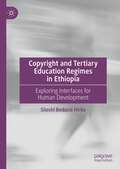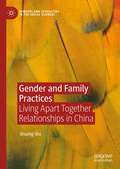- Table View
- List View
Reconceptualizing Social Justice in Teacher Education: Moving to Anti-racist Pedagogy
by Susan Browne Gaëtane Jean-MarieThis edited volume explores and extends themes in contemporary educational research on teacher preparation and the evolution in social justice education to antiracist pedagogy. These times call for teacher education to reconsider how the work devoted to social justice is explicit and intentional about its commitment to a racially just society. What does it mean for teacher education to seize this moment to confront racism and inequities that continue to perpetuate in society and school? The book highlights efforts that are being augmented to prepare teacher candidates and future faculty to address systemic racism in their teaching practices.
Securitization and Democracy in Eurasia: Transformation and Development in the OSCE Region
by Anja Mihr Paolo Sorbello Brigitte WeiffenThis open-access book presents cutting-edge research on securitization and democratic development in the OSCE Region. Gathering contributions by practitioners and researchers from various disciplines, it presents case studies and highlights recent activities of proactive engagement in democratic institution-building and responding to security threats from the Balkans to Central Asia. The volume is divided into three parts, the first of which focuses on security-related matters, armed conflicts, minorities, and women’s safety, as well as the roles that civil society, foreign governments, social media, and external donors play in this area. These contributions illustrate how the OSCE’s informal approach to peace, security, and securitization as norm entrepreneur is closely linked to the level of democracy among its member states. The second part presents a special section on the political implications of China’s Belt and Road Initiative (BRI), assessing the impact of this infrastructural program on the levels of democracy and/or autocracy in Eurasia. The third part consists of short chapters outlining future research and debates. The book will appeal to students and scholars of international relations, security studies, and the human rights-politics nexus. This is the 2022 instalment in a series of books released by the OSCE Academy in Bishkek. The OSCE works to promote Minority Protection, Security, Democratic Development and Human Rights, guided by the Office for Democratic Institutions and Human Rights (ODIHR), and to enhance securitization and development policies in Eurasia, Europe, Central Asia and North America. Since being founded in 1993, the OSCE and its agencies and departments have attracted a wealth of academic research in various fields and disciplines, ranging from economic development and election monitoring to enhancing global principles of human rights and securitization.
Masks and Human Connections: Disruptive Meanings and Cultural Challenges
by Luísa Magalhães Cândido Oliveira MartinsThis interdisciplinary collection explores four distinct perspectives about the mask, as object of use for protection, identity, and disguise. In part I, contributors address human identities within collective social performance, with chapters on performativity and the far right and masked identities in political resistance and communication. Part II focuses on the mask as a signifying object with strong representational challenges, exploring representations in festivals, literature, and film. Part III investigates the ambiguous use of the mask as a protective and concealing element, delving into visual culture and digital social media contexts. Finally, Part VI draws on the work of Levinas and Deleuze to investigate a philosophical view of the mask that addresses memory and ethics within intersubjective relationships. Questioning the contemporary world, using communication, sociology, visual culture, and philosophical theory, the volume provides a pedagogical and formative perspective on the mask.
Digital and Sustainable Transformations in a Post-COVID World: Economic, Social, and Environmental Challenges
by Salvador EstradaCurrent social, economic, and environmental challenges presented by the United Nations’ Sustainable Development Goals may be partially attained by digitalization and sustainable practices diffusion. The antecedents, occurrences, and consequences of this process are currently under investigation, but the big challenge is to get a systemic view. This book attempts to bring such a view into focus.Digital and Sustainable Transformations in a Post-COVID World is dedicated to studying the consequences of the global crisis caused by the COVID-19 pandemic and the new needs and practices inherent in developing and disseminating digital and clean technologies.
Gender, Cinema, Streaming Platforms: Shifting Frames in Neoliberal India
by Runa Chakraborty Paunksnis Šarūnas PaunksnisThis book offers interdisciplinary examination of gender representations in cinema and SVOD (Subscription Video on Demand) platforms in India. This book will identify how the so-called feminist enunciations in twenty-first century film and SVOD content in India are marked by an ambiguous entanglement of feminist and postfeminist rhetoric. Set against the backdrop of two significant contemporary phenomena, namely neoliberalism and the digital revolution, this book considers how neoliberalism, aided by technological advancement, re-configured the process of media consumption in contemporary India and how representation of gender is fraught with multiple contesting trajectories. The book looks at two types of media—cinema and SVOD platforms, and explores the reasons for this transformation that has been emerging in India over the past two decades. Keeping in mind the complex paradoxes that such concomitant process of the contraries can invoke, the book invites myriad responses from the authors who view the shifting gender representations in postmillennial Hindi cinema and SVOD platforms from their specific ideological standpoints. The book includes a wide array of genres, from commercial Hindi films to SVOD content and documentary films, and aims to record the transformation facilitated by economic as well as technological revolutions in contemporary India across various media formats.
Digitisation and Low-Carbon Energy Transitions
by Siddharth Sareen Katja MüllerThe world is digitising as the need for low-carbon transitions gains urgency. Decarbonising energy requires the digital process control of energy production, transmission and end use. Diversified electrification across sectors requires real-time digital coordination of distributed energy production, At the same time, digitisation is accompanied by significant increases in energy demand, partly compensated through energy efficiency gains.The emergent linkages between digitisation and decarbonisation – that constitute and enable the twin transition – are the subject of this book. The collection features authors from across the social sciences who situate digitisation and low-carbon energy transitions in the socio-technical and political economic contexts in which they unfold, to offer insights on the dynamics and contingencies of digitisation in and beyond the energy sector.This is an open access book.
Insurrectionist Ethics: Radical Perspectives on Social Justice (African American Philosophy and the African Diaspora)
by Jacoby Adeshei Carter Darryl Scriven'Insurrectionist Ethics' is the name given to denote the myriad forms of justification for radical social transformation in the interest of freedom for oppressed people. It is a set of advocacy systems that usually aim at liberation for specified populations under siege in a given society. While the identities of these beleaguered groups is always intersectional, one salient criterion of group membership is often chosen to be the rallying point for solidarity. Whether the movement is “Black Lives Matter, “Gay Pride”, or “Poor People’s Campaign,” at the nucleus of each is a cry for emancipation. The contributions in this volume put forward bold, forcefully argued, provocative claims that challenge in a fundamental and radical way the presuppositions, values, and beliefs that underwrite the systems and structures that insurrectionist ethics calls into question. The volume begins with a section defining and theorizing what insurrectionist ethics is, and then moves to a section studying insurrectionist ethics across the Americas. Additional sections focus on applications of and correctives to insurrectionist ethics, pragmatism and naturalism, and the past, present, and future of insurrectionist ethics.
21st Century Media and Female Mental Health: Profitable Vulnerability and Sad Girl Culture
by Fredrika ThelanderssonThis open access book examines the conversations around gendered mental health in contemporary Western media culture. While early 21st century-media was marked by a distinct focus on happiness, productivity and success, during the 2010s negative feelings and discussions around mental health have become increasingly common in that same media landscape. This book traces this turn to sadness in women’s media culture and shows that it emerged indirectly as a result of a culture overtly focused on happiness. By tracing the coverage of mental health issues in magazines, among female celebrities, and on social media this book shows how an increasingly intimate media environment has made way for a profitable vulnerability, that takes the shape of marketable and brand-friendly mental illness awareness that strengthens the authenticity of those who embrace it. But at the same time sad girl cultures are proliferating on social media platforms, creating radically honest spaces where those who suffer get support, and more capacious ways of feeling bad are formed. Using discourse analysis and digital ethnography to study contemporary representations of mental illness and sadness in Western popular media and social media, this book takes a feminist media studies approach to popular discourse, understanding the conversations happening around mental health in these sites to function as scripts for how to think about and experience mental illness and sadness
Tackling Stereotype: Corporeal Reflexivity and Politics of Play in Women’s Rugby (New Femininities in Digital, Physical and Sporting Cultures)
by Charlotte BranchuThis book presents a critical rethinking of assumptions that have informed our understanding of women’s engagement in contact sport, based on an in-depth ethnography with an English rugby team. Looking at the day-to-day concerns of women who play rugby, this work provides a refreshing perspective on different ways of doing femininities in postfeminist times. Women’s rugby is one of the world’s fastest growing sports, yet it is also a physical game that is traditionally the preserve of men. Tackling Stereotypes reveals the cultural and symbolic stigma that ‘sticks’ to women’s rugby players and the tactics they use to carve out space for themselves and fight for legitimacy. It also argues that players engage in pragmatic politics, informed by their participation, that aims to enact realistic change. Branchu develops a situational sociology that furthers debates in the understanding of gender, belonging, becoming, embodiment, resistance politics, and the sociological study of sport.
Pathways and Experiences of First-Generation Graduate Students: Wary and Weary Travelers
by John S. LevinThis book focuses on first-generation graduate students in the US and the graduate or post-baccalaureate programs that house and educate these students. The several voices in this book, including first-generation graduate students, address the phenomena of graduate students’ experiences and related university practices, with the practices connected to traditional academic and Western values and to academic and neoliberal institutional logics. First-generation graduate students’ narratives, or testimonies, serve as the foundation of the analysis of students’ pathways to graduate school and their experiences within graduate school. The conditions for first-generation graduate students in their programs require remedies that will facilitate student well-being, peer community attachment, and persistence, and will educate and train students for achievement in graduate school and for employment after graduate school.
Reading Plato through Jung: Why must the Third become the Fourth?
by Paul BishopThis book examines the Jungian imperative that the Third must become the Fourth through the lens of Carl Jung’s complex reception of Plato. While in psychoanalytic discourse the Third is typically viewed as an agent that brings about healing, the author highlights that, in the case of Jung, an early emphasis on the Third as the “transcendent function” gave way to an increasing insistence on the importance of the Fourth. And yet, he asks, why must “the Third become the Fourth”? Paul Bishop begins with a survey of work on Jung’s relation to Plato, before turning to Jung’s readings of the Timaeus and Black Books, as well as Goethe’s Faust II and Nietzsche’s Zarathustra. He proceeds to unpick Jung’s statements on the Third and the Fourth though a compelling analysis of how Jung draws upon religious and alchemical traditions, Pythagorean numerology, his own dream-like experiences and Plato’s cosmology. This book will appeal to practitioners and to scholars working in the history of ideas, psychoanalysis, philosophy, and psychoanalytic theory.
Translation, Disinformation, and Wuhan Diary: Anatomy of a Transpacific Cyber Campaign
by Michael BerryDuring the early days of the COVID-19 health crisis, Fang Fang’s Wuhan Diary provided an important portal for people around the world to understand the outbreak, local response, and how the novel coronavirus was impacting everyday people. But when news of the international publication of Wuhan Diary appeared online in early April of 2020, Fang Fang’s writings became the target of a series of online attacks by “Chinese ultra-nationalists.” Over time, these attacks morphed into one of the most sophisticated and protracted hate Campaigns against a Chinese writer in decades. Meanwhile, as controversy around Wuhan Diary swelled in China, the author was transformed into a global icon, honored by the BBC as one of the most influential women of 2020 and featured in stories by dozens of international news outlets. This book, by the translator of Wuhan Diary into English, alternates between a first-hand account of the translation process and more critical observations on how a diary became a lightning rod for fierce political debate and the target of a sweeping online campaign that many described as a “cyber Cultural Revolution.” Eventually, even Berry would be pulled into the attacks and targeted by thousands of online trolls. This book answers the questions: why would an online lockdown diary elicit such a strong reaction among Chinese netizens? How did the controversy unfold and evolve? Who was behind it? And what can we learn from the “Fang Fang Incident” about contemporary Chinese politics and society? The book will be of interest to students and scholars of translation, as well as anyone with special interest in translation, US-Chinese relations, or internet culture more broadly.
Marek Thee: A Journey through the 20th Century (SpringerBriefs on Pioneers in Science and Practice #32)
by Marek Thee Nils Petter Gleditsch Stein Tønnesson Marta Bivand ErdalMarek Thee was a Jewish Polish journalist, scholar, and activist. This book tells his life from narrowly escaping death in the Holocaust to exile in Palestine, where he became attached to the Polish consular service. On his return to Poland in 1950, he worked for the Foreign Ministry and later for the Polish Institute for International Affairs. He served as Head of the Polish delegation to the International Control Commission in Indochina in the late 1950s. In 1968 he lost his job and his Polish citizenship in a nationalistic and antisemitic campaign. He was able to move to Norway where he worked for twenty years at the Peace Research Institute Oslo (PRIO), editing an international quarterly journal, Bulletin of Peace Proposals and doing research on the arms race. In retirement, he continued his research and writing at the Norwegian Human Rights Institute. The book vividly relates the drama of his life in Poland, Palestine, Indochina, and Norway.This is an open access book.
Soziale Netzwerke – Die Familie von heute: Recht und Politik der Regulierung
by Vanessa KirchSoziale Netzwerke haben eine Fülle von Problemen in Bezug auf die Privatsphäre und den Schutz personenbezogener Daten aufgeworfen. Die Nutzung sozialer Netzwerke ist zu einem zentralen Anliegen von Rechtswissenschaftlern, politischen Entscheidungsträgern und den Betreibern sowie den Nutzern dieser sozialen Netzwerke geworden. Dieses bahnbrechende Buch beleuchtet die Bedeutung des Datenschutzes im Zusammenhang mit den neuen elektronischen Kommunikationstechnologien von heute, da es widersprüchliche Ansprüche zum Schutz der nationalen und internationalen Sicherheit, der Freiheit des Internets und wirtschaftlicher Überlegungen aufzeigt. Auf der Grundlage des intellektuellen Rahmens der New Haven School of Jurisprudence stellt der Autor das geltende Recht zum Schutz der Privatsphäre und zu sozialen Medien in internationaler und vergleichender Perspektive dar und konzentriert sich dabei auf die Vereinigten Staaten, die Europäische Union und ihre Allgemeine Datenschutzverordnung von 2018 sowie auf Deutschland, das Vereinigte Königreich und Lateinamerika. Das Buch bewertet das geltende Recht, erörtert Alternativen und gibt Empfehlungen für eine öffentliche Ordnung der Menschenwürde. Übersetzt mit www.DeepL.com/Translator (kostenlose Version)
The Humanities in the Digital: Beyond Critical Digital Humanities
by Lorella ViolaThis open access book challenges the contemporary relevance of the current model of knowledge production. It argues that the full digitisation of society sharply accelerated by the COVID-19 pandemic has added extreme complexity to the world, conclusively exposing the inadequacy of our current model of knowledge creation. Addressing many of the different ways in which reality has been transformed by technology – the pervasive adoption of big data, the fetishisation of algorithms and automation, and the digitalisation of education and research – Viola examines how the rigid conceptualisation in disciplines’ division and competition is complicit of promoting a narrative which has paired computational methods with exactness and neutrality whilst stigmatising consciousness and criticality as carriers of biases and inequality. Taking the humanities as a focal point, the author retraces schisms in the field between the humanities, the digital humanities and critical digital humanities; these are embedded, she argues, within old dichotomies: sciences vs humanities, digital vs non-digital and authentic vs non-authentic. Through the analysis of personal use cases and exploring a variety of applied contexts such as digital heritage practices, digital linguistic injustice, critical digital literacy and critical digital visualisation, the book shows a third way: knowledge creation in the digital.
A Symbolic Approach to Humanitarian Action: It Takes One to Know One (Contemporary Humanitarian Action and Emergency Management)
by Diego OteguiThis book aims to present an alternative view of humanitarian action. It adds to current conversations and dilemmas within the humanitarian sphere by departing from traditional views that consider humanitarian interventions as a concrete human activity aimed at providing relief to disaster victims. Much differently, it invokes the idea that humanitarian action is also a cognitive process. In this process, both humanitarians and disaster survivors alike, unknowingly, apply historically, societally, and culturally defined symbolic constructions to make sense of post-disaster information and to make decisions. In the specific case of humanitarian workers, these symbolic constructions influence how they understand their post-disaster reality, including how they relate to those they consider to be in pain or distress. This way of looking at humanitarian action builds upon a robust theoretical framework called Institutional Logics, which helps us identify and interpret how individuals make sense of their reality. So it brings the complex world of the individual into a discussion that generally considers the organization as the unit of analysis. Studying humanitarian action through this alternative lens makes it easy to see that objective and verifiable post-disaster information is a necessary but not a sufficient condition to design humanitarian interventions, let alone assess their value and benefits. A Symbolic Approach to Humanitarian Action: It Takes One to Know One aims to bridge the gap between research and practice in humanitarian action by translating academic knowledge into an accessible format that can be used by practitioners to improve their work on the ground.
Ninth Art. Bande dessinée, Books and the Gentrification of Mass Culture, 1964-1975 (Palgrave Studies in Comics and Graphic Novels)
by Sylvain LesageIn France, comics are commonly referred to as the "ninth art". What does it mean to see comics as art? This book looks at the singular status of comics in the French cultural landscape. Bandes dessinées have long been published in French newspapers and magazines. In the early 1960s, a new standard format emerged: large hardback books, called albums. Albums played a key role in the emergence of the ninth art and its acceptance among other forms of literary narrative. From Barbarella in 1964 to La Ballade de la mer salée in 1975, from Astérix and its million copies to Tintin and its screen versions, within the space of just a few years the comics landscape underwent a deep transformation.The album opened up new ways of creating, distributing, and reading bandes dessinées. This shift upended the market, transformed readership, initiated new transmedia adaptations, generated critical discourse, and gave birth to new kinds of comics fandom. These transformations are analysed through a series of case studies, each focusing on a noteworthy album. By retracing the publishing and critical history of these classic bandes dessinées, this book questions the blind spots of a canon based on the album format and uncovers the legitimisation processes that turned bande dessinée into the ninth art.
Drug Legalization: A Philosophical Analysis
by Chris MeyersThis textbook introduces students to the various arguments for and against the prohibition of recreational drugs. The arguments are carefully presented and analyzed, inviting students to consider the competing principles of liberty rights, paternalism, theories of punishment, legal moralism, and the social consequences of drug use and drug laws. Meyers extends this examination by presenting alternatives to the prohibition/legalization dichotomy, including harm reduction, decriminalization, and user licensing or on-premise use. The presentation invites readers to think clearly about the reasons and principles that should determine public policy and law, while also delving into the deeper philosophical questions underlying the drug prohibition debate. Is it morally wrong to use drugs? If so, would that be reason enough to make it illegal? Are there good reasons in favor of using illicit drugs? Do addicts lack free will, and if so, would it be unjust to punish them? What is (or ought to be) the purpose of punishment? Is the state justified in limiting the freedom of competent adults for their own good? What should be the goal of drug policy, reduced use or reduced harm?The purpose of the book is twofold. First, it is a review of the arguments for and against drug prohibition, a useful tool for policy makers, activists, and concerned citizens with an understanding of the relevant considerations for determining how we should reform our failing drug policy. Second, the book serves as a case study in the deeper issues of justice, the nature of law, rights and liberties, and the public good. Students studying applied ethics, political science, or public policy will benefit greatly from Meyers' approach.
A Social History of Administrative Science in Italy: Planning a State of Happiness from Liberalism to Fascism (Italian and Italian American Studies)
by Andrea RapiniThis book traces the origins, life and death of Administrative Science in Italy as an academic discipline between the nineteenth and twentieth centuries. It does so by combining the study of ideas, institutional history, intellectual history and social history. The Faculty of Law first introduced Administrative Science in 1875, with the aim of providing the elite with the necessary tools to distribute wealth more equally, to take care of the population and, thus, to make the young Italian State more legitimate in the eyes of the emerging masses. Law and social sciences were merged with the aim of increasing reforms, including that of creating a State of Happiness for all citizens. Throughout its 70-year existence, Administrative Science was deprived of its contents and scientific independence, and academically overshadowed by Administrative and Public law. Finally, although the liberal elites discarded the reformer project of Administrative Science even before Fascism turned everything upside down, most of the original traits of this knowledge were absorbed into Fascist corporate and totalitarian structures.
Evidence-Based Policing: Uses, Benefits and Limitations
by Garth den HeyerThe volume aims to increase knowledge and understanding of how evidence-based policing is being adopted and implemented by police agencies in the United States and whether it is affecting the agencies' processes, strategies, community relationships and delivery of community-oriented policing services. This exploration is based on data drawn from the literature, interviews and extensive field research that resulted in the case studies presented and discussed in the book. The goal of this text will be to provide the reader with a thorough analysis of the concepts, arguments and challenges facing evidence-based policing. The history of evidence-based policing, how evidence-based practices are used in the health and social sectors, and in the United Kingdom will be examined. In addition, reasonable options for improving the use of evidence-based policing will be proposed. Overall, very practical policy implications will be outlined by a highly recognized professional who has considerable experience in policing and related research.
Citizen Fetus: The Changing Image of Motherhood
by Alessandra PiontelliThis book discusses many aspects of fetuses and motherhood from fields as wide as sociology and medicine. It examines changing perceptions of the fetus over recent decades, comparing western ideas with those of non-western countries; examining maternal mental health during COVID-19 and charting the ascent of the 'fetus' to a cult phenomenon, which has currently reappeared in the courts. This work, given its multifaceted approach, will be of interest to a varied and wide range of people, from parents to doctors and nurses, to anthropologists and ethnologists, to scientists, to students of various disciplines, to psychologists and psychoanalysts, to lawyers dealing with the topic and to a general public simply interested in these fundamental themes.
Leading with Feminist Care Ethics in Higher Education: Experiences, Practices, and Possibilities
by Christie SchultzThis book explores how academic leaders throughout higher education experience and practice care and the ethics of care. Drawing on a narrative inquiry study of experiences and practices of feminist care ethics in higher education leadership, Schultz counters academic norms, including expectations of competition and criticism across all activities, by uncovering the common experiences of academic leaders who intentionally adopt practices guided by an ethics of care and relationality. Within the context of institutions of higher education responding to present-day social movements, the book highlights how practices of care-centered leadership can enable change that begins on campus and reaches outwards to positively impact the community.
Narratives of Motherhood and Mothering in Fiction and Life Writing (Palgrave Macmillan Studies in Family and Intimate Life)
by Helena Wahlström Henriksson Anna Williams Margaretha FahlgrenThis open access volume offers original essays on how motherhood and mothering are represented in contemporary fiction and life writing across several national contexts. Providing a broad range of perspectives in terms of geopolitical places, thematic concerns, and theoretical and interdisciplinary approaches, it demonstrates the significance of literary narratives for understanding and critiquing motherhood and mothering as social phenomena and subjective experiences. The chapters contextualize motherhood and mothering in terms of their particular national and cultural location and analyze narratives about mothers who are firmly placed in one national context, as well as those who are in “in-between” positions due to migrant experiences. The contributions foreground and link together the themes central to the volume: embodied experience and maternal embodiment; notions of what is “normal” or natural (or not) about motherhood; maternal health and illness; mother-daughter relations; maternality and memory; and the (im)possibilities of giving voice to the mother. They raise questions about how motherhood and mothering are marked by absence and/or presence, as well as by profound ambivalences.
Copyright and Tertiary Education Regimes in Ethiopia: Exploring Interfaces for Human Development
by Sileshi Bedasie HirkoThis book explores the interlinkages between copyright and tertiary education regimes, and their complementary roles for sustainable human development. Emphasizing issues that are not addressed in-depth in the existing works, this book employs a new theoretical perspective in order to inform the exploration of the interlinkages through the lens of human development. To this effect, the book adopts the capabilities approach (CA) as an inclusive development framework that is suitable for examining the interfaces among copyright, tertiary education, and human development in Ethiopia.
Gender and Family Practices: Living Apart Together Relationships in China (Genders and Sexualities in the Social Sciences)
by Shuang QiuThis book examines how gender and heterosexuality structure the lived experiences of people in living apart together (LAT) relationships in contemporary Chinese society. Using in-depth interview data with Chinese LAT people of different ages, the author explores why they live apart; how they construct and make sense of their everyday family lives and negotiate their gender roles; and how they experience intimacy while being physically apart. This text sheds new insights on non-cohabitating intimate partnerships by bringing together themes of gender, family, intimacy, and relationality. Through looking at people’s lived experiences in LAT relationships, it argues that practices of family and intimacy are closely implicated with doing gender, and consequently, that gendered family lives and heterosexuality are reconstructed, rather than deconstructed, in order to reclaim conventional forms of family and gender norms in Chinese social, historical and cultural contexts.This book will be of interest to scholars across Gender and Sexuality Studies as well as Family Studies, in addition to scholars of contemporary Chinese culture and society.
